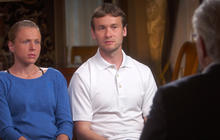MOSCOW — Russia’s Olympic Committee says eight of the country’s athletes have registered positive in doping retests for the 2012 London Games.
The brief statement from the ROC on Saturday did not give names or what disciplines the athletes were in, but said they came from three different sports.
It said further information would not be released until so-called “B samples” were tested that would confirm or contradict the retests.
On Friday, the International Olympic Committee said that 23 athletes from five sports and six countries had positive findings in retests with improved techniques on 265 samples from the London Games.
The IOC did not identify the athletes, their sports or their nationalities. The current retesting program targeted athletes who could be eligible to compete at the Rio de Janeiro Olympics in August.
“The reanalysis program is ongoing, with the possibility of more results in the coming weeks,” the IOC said.
The 23 London athletes are in addition to the 31 who tested positive in retesting from the Beijing Olympics. The IOC said Friday that another sample from Beijing has since shown “abnormal parameters,” and the case was being followed up.
Overall, up to 55 athletes from the past two Summer Olympics could be retroactively disqualified and have their results, and any medals, stripped.
The IOC stores Olympic doping samples for 10 years so they can be reanalyzed when new testing methods become available.
“These reanalyses show, once again, our determination in the fight against doping,” IOC President Thomas Bach said. “We want to keep the dopers away from the Olympic Games in Rio de Janeiro. This is why we are acting swiftly now.”
Bach said he has appointed a disciplinary commission which “has the full power” to sanction athletes.
The IOC still has to retest the athletes’ “B” samples. Formal positive cases are not declared until the “B” samples confirm the original findings.
The IOC said the athletes, their national Olympic committees and their international sports federations were being informed ahead of formal disciplinary proceedings.
“All athletes found to have infringed the anti-doping rules will be banned from competing at the Olympic Games” in Rio, it said.
The IOC said the retests were carried out using “the very latest scientific analysis methods.”
World Anti-Doping Agency president Craig Reedie said the results showed the system of saving drug samples for later retesting works.
“The discovery of 23 positives shows the effectiveness of new methods and modern science,” Reedie told The Associated Press. “So athletes be warned. If you were cheating and thought you got away with it, you will be caught.”
But based upon what CBS News has learned from a now-tainted Russian lab’s former director, any positive drug tests from the 2014 Sochi Winter Games disappeared a long time ago.
Dr. Grigory Rodchenkov shared details of a systematic cover-up in Sochi during Skype conversations with Vitaly Stepanov, a former Russian anti-doping official turned key whistleblower.
Stepanov allowed CBS’ “60 Minutes” to listen to 15 hours of conversations he secretly recorded with Rodchenkov.
In the recordings, Rodchenkov named Russian gold medalists in three sports — bobsled, skeleton and cross-country skiing — whose dirty drug tests he helped cover up, “60 Minutes Sports” correspondent Armen Keteyian reports. It was all part, Rodchenkov said, of an elaborate scheme to protect Russia’s Olympic medal winners, with the help of his country’s intelligence service, known as the FSB.
The FSB figured out a way to open bottles considered to be tamper-proof containing urine from drug-tainted athletes, Keteyian reports. Then they filled the bottles with clean urine collected from athletes before they started doping.
Rodchenkov said he then had two weeks after the Sochi games to make sure, in his words, people turned out to be clean before test samples were sent to the International Olympic Committee in Switzerland for storage, Keteyian reports.
The World Anti-Doping Agency is investigating Rodchenkov’s claims.
The IOC retested 454 samples from Beijing. Of those original 31 positives, the Russian Olympic Committee confirmed that 14 involved Russian athletes.
Russian state TV said they included 10 medalists, among them high jumper Anna Chicherova. She won the bronze medal in Beijing and went on to take gold in London.
Match TV said 11 of the 14 athletes from Beijing were from track and field, including 4×100-meter relay gold medalist Yulia Chermoshanskaya.
Spanish hurdler Josephine Onyia has been identified in Spain as being one of the athletes whose samples from Beijing was positive.
The International Association of Athletics Federations is set to decide on June 17 whether to maintain or lift its suspension of Russia’s track and field athletes from global competition. Russia has argued it would be unfair to ban its entire team from the Rio Olympics, but critics say evidence of systematic, state-backed doping should be enough to keep them out.
Including the new retest results, the total number of doping cases for the past two Summer Olympics has soared to 32 for London and 57 for Beijing. The previous high for a single Olympics was 26 cases from the 2004 Athens Games, according to IOC statistics.
Britain’s national anti-doping agency welcomed the latest findings from the London retests.
“The ability to retest samples, as a result of new intelligence or the development of new testing techniques, is a vital tool in the fight against doping in sport,” UK Anti-Doping operations director Pat Myhill said. “Retrospective analysis allows us to pursue those who cheat clean athletes, long after the competition has ended.”





